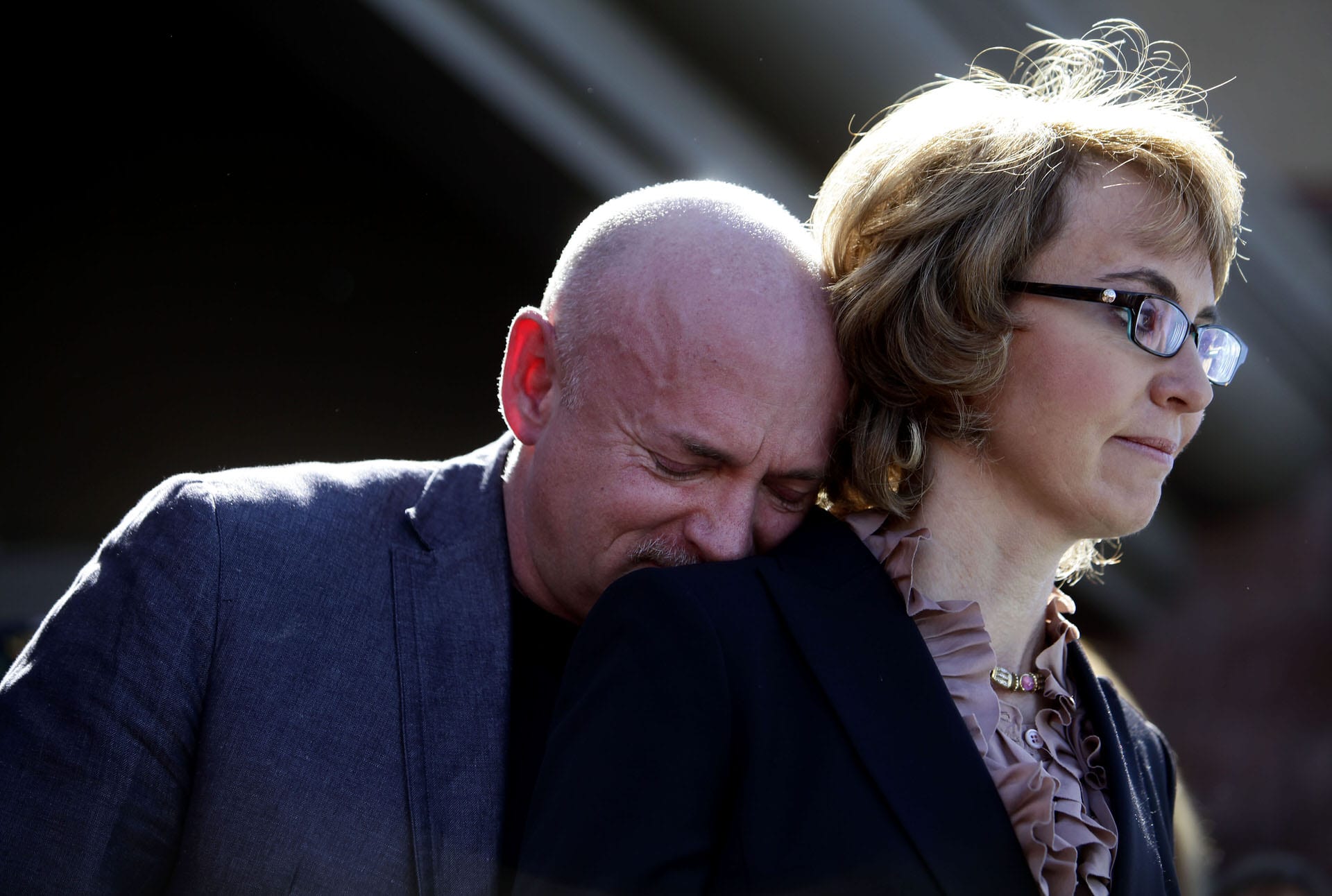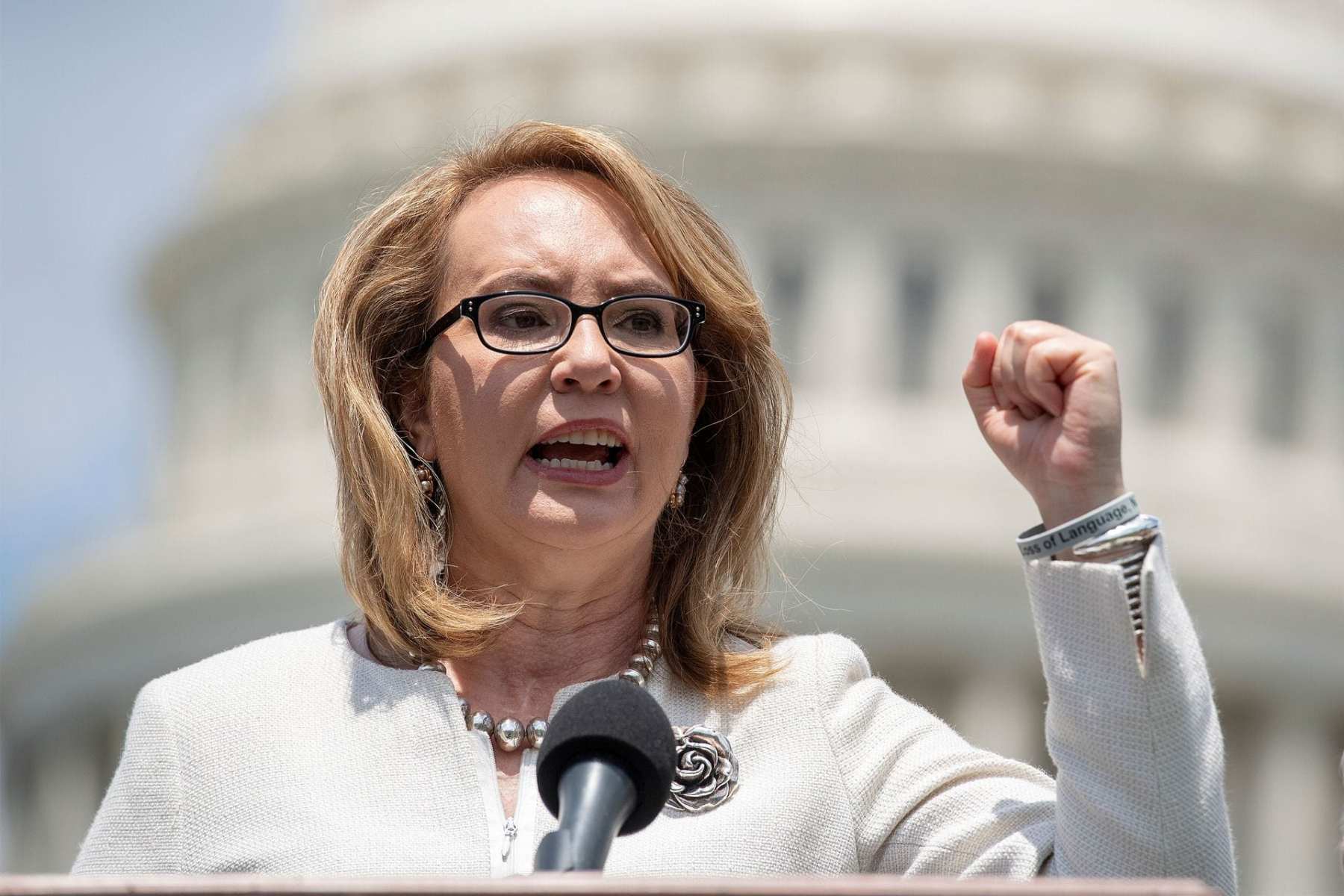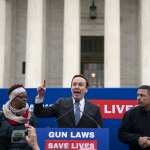Ten years ago, on January 8, 2011, Democratic Rep. Gabby Giffords of Arizona was meeting with a group of constituents in a Tucson-area supermarket parking lot when a 22-year-old man with a semiautomatic pistol opened fire on the group of roughly 25. He killed six and injured 13, including Giffords, who was shot in the head.
Giffords was critically injured — some media outlets initially reported she had died at the scene — and put in a medically induced coma. Later that month, she began basic physical therapy. In January of the next year, she resigned from the House of Representatives to focus on her recovery.
In January 2013, just weeks after an armed 20-year-old man killed 20 young children and six staff members at Sandy Hook Elementary School in Connecticut, Giffords and her husband, Mark Kelly, started the Americans for Responsible Solutions, a political action committee that supported candidates who backed new gun safety laws. (Kelly, a retired Navy captain and former astronaut, was in November elected by Arizona to the U.S. Senate, where Democrats will now hold the majority, possibly easing the passage for some bills to become law.) In 2016, the PAC merged with the Law Center to Prevent Gun Violence to form the organization Giffords, which has lobbying, research and super PAC divisions.
In a recent interview with The 19th, Giffords, who served in the Arizona statehouse before her election to Congress, reflected on her work to reduce gun violence, her recovery and the prospects for passing gun safety measures, ahead of the 10th anniversary of her assassination attempt.
Read: The 19th’s full story on Giffords’ efforts here.
Giffords’ interview was conducted by email — before Democratic victories in two Georgia runoff elections flipped Senate control — because she continues to grapple with aphasia, a language disorder often associated with head injuries.
This interview has been edited for length and clarity.
The 19th: As it relates to your work, you prefer “gun safety” to “gun control.” What is the meaningful difference and why does it matter?
Giffords: Pretty simple: We work towards policies that will keep people safer from gun violence. As we saw this year, it’s a crisis that didn’t go away even as we grappled with a global pandemic. We’re not trying to control anyone, through guns or any other way. Our opponents — the National Rifle Association (NRA), the gun manufacturers, politicians who’ve exploited their power — use that phrase to scare people and vilify the movement. As an organization we stand for gun safety, not taking guns away from responsible owners. My husband, Mark, and I own guns, and we know that sensible solutions we can all agree on are there, they’re possible and they’ll save lives. Coming out of this polarized, challenging time for the country, I think people are really looking for our government to take action on things we can all agree on that will make a difference. Americans deserve to live without fear of gun violence. We can and should pass measures like universal background checks while the new administration must take decisive steps like establishing an interagency task force to take a comprehensive approach to the problem. These are actions we can do to make us all safer.
How soon after your shooting injury did you know your next step would be advocating for safer gun laws? Can you talk a little bit about getting your advocacy organization off the ground while you were still recovering personally?
For a long time after I was shot, I didn’t think so much about advocacy around guns, specifically. I had to work so hard on recovery. It is hard to describe what it’s like to come back from an injury like mine: painstaking; relentless; frustrating. I had to relearn everything. How to sit up. How to walk. How to eat with my left hand (I’m right-handed). How to talk. I have aphasia; that means that I have as much to say as I ever did, but I struggle to find every word. I did hours and hours of therapy every day; I did yoga and other practices to help my body and mind heal and help me grow stronger so I could move forward.
I made a decision, after some time, to step down from Congress, the best job I’d ever had, to focus on my recovery. That was painful: I loved representing my community in southern Arizona; I loved negotiating with my colleagues, finding ways to use policy to make people’s lives better. But it was right for me and right for Arizona, and so I stepped down. But I never stepped away from my life’s purpose: working to make my community and my country better. I was working to get better, and exploring, thinking about how, in a new capacity as a private citizen, I could contribute. Mark and I talked about it all the time — after all, both of us had spent decades in public service. Public service is part of our identity. And we don’t give up on ourselves or each other.
And then the shooting at Sandy Hook happened. I watched the images of those children being led out of the school. I think I was in shock at first. I could not believe such violence could happen to young students and their teachers. I told Mark we had to do something. Later, we went to Connecticut and met with those families. As with the families of the people who died in the attack on my life, the loss those families endure every day — and the dignity and grace they demonstrate — is humbling and inspiring. I could not resign myself to a life spent watching more unnecessary gun deaths and injuries. So, I turned to the tool I know the best: using policy to solve problems. We founded Giffords to be a voice in the debate that is inclusive, that recognizes that we can make huge strides in gun safety without infringing on people’s 2nd Amendment rights. It felt scary and exhilarating to jump back into a desperately needed, hugely challenging issue, but it also felt comfortable. Advocating for people, using policy wisely. This is what I’ve done with all my adult life. It is a new chapter for me.
What does that recovery process look like now in terms of continued therapy and treatment? How do you balance that with your advocacy work?
Oh, recovery is ongoing. I think about recovery as being forever: I’m never going to say, ‘OK, I think I’ve recovered enough.’ I mean, why would I? There’s always more to do. I’ve biked the Tour de Tucson since I was shot, I’ve gone skydiving — I’ve done things I didn’t do before!
But I also always say, ‘It’s a long hard haul.’ Whether it’s me you see on TV or someone you know in your life recovering from an accident or a stroke or something, know that every day they have to get up and resolve to keep moving, to keep working.
In 2018, many of the House candidates you backed won, and Democratic House Speaker Nancy Pelosi held gun safety votes to put lawmakers on record. In 2019, the Virginia State Legislature flipped from Republican to Democratic control. What were the gun safety victories in 2020?
The NRA’s favorite politician — Donald Trump — will no longer be able to open the door for them at the White House. I was so proud to see Joe Biden and Kamala Harris win the race for the White House. They understand the severity of this crisis, they talked about it from day one on the campaign trail, and they will be the strongest gun safety administration we’ve ever seen.
Next, the House of Representatives might look a little different but it’s still controlled by the Democratic majority that made history by passing the first gun safety legislation in a generation. We are ready to support them once again in making foundational policy changes like universal background checks a priority.
Since the founding of Giffords, we’ve worked to change politics and policy in states, including Colorado. This year we did everything we could to help Gov. John Hickenlooper become the next senator from Colorado. He was one of the first Democratic governors from a western state to pass stronger gun safety laws. My last trip before the pandemic limited travel was to the Denver area, where I told Coloradans the nation was counting on them to be bold and courageous. This was the defining race for Giffords this cycle and was a powerful signal that it’s getting harder for NRA favorites to win statewide races in Colorado.

Your husband, Mark Kelly, is serving in the Senate nearly a decade after you left the House due to your injury and recovery. How has Congress changed, if at all, during that period?
When I was a member of Congress, I took great pride in my ability to reach across party lines to find solutions that would help everyday Americans. Now, for too many members, party affiliation and getting reelected seems to matter more than the people they are meant to serve. I’ve seen this in my efforts to pass common-sense gun laws that are supported by nearly 90 percent of America yet get blocked each year by Republicans in the Senate. We need more members of Congress to show courage and do the right things, even when it’s hard.
You were the youngest woman to serve in Arizona’s state Senate, and when you were elected to the U.S. House, you won in a ‘red’ district. Now both of the state’s senators are Democrats. How has Arizona changed politically over the past 10 to 15 years? Has it surprised you? Is it possible to run as a centrist Democrat or even a Republican and win talking about gun safety?
Of course it is! Both of our state’s senators did it! Sen. John McCain, who is absolutely an icon in Arizona and was a friend and mentor to me and to Mark, was a moderate [Republican] who worked on this issue for a long time, and he voted yes on the 2013 background checks bill that I worked so hard on.
Arizona, to me, has always been a place of real diversity and individuality. It’s one of the reasons I love it so much. In Arizona, we have ranchers, and mountain lions, retirees and veterans and folks serving at Bases like Davis-Monthan, near where I live. We’ve got folks moving here from other places to work in our growing tech and energy sectors. We love our landscape; we take care of our environment and protect our beautiful spaces. You can’t reduce Arizonans to a stereotype. People are organizing, younger people are speaking up, it’s wonderful. It’s not partisan, necessarily. I think people are fed up about partisan fights and they want their representatives to put their shoulders to the wheel and deliver.
A record number of women will be serving in the next Congress. Obviously, Democratic and Republican women have different priorities and policy positions. Do you think the sheer number of women now in the House, especially, will have an impact on how the chamber governs?
I’m so glad you asked me about this, because it’s so important to me. You know, Christina-Taylor Green was killed when she was just nine years old, waiting to meet me [at the event in Tucson ten years ago]. She came because she was interested in running for office. I don’t know whether she would have been a Democrat or a Republican and it doesn’t matter: I know she would have been great.
I do think more women, of both parties, makes a difference. There’s data that shows it. Women move more legislation, they pay attention to different things because of their lived experience. I also think women are used to just getting it done, moving past the challenges and carrying on. There’s a story I love: in 2016 the Senate was in session and there was a blizzard in Washington and do you know who showed up to work? The women. The morning after the blizzard, the entire chamber was filled with women leaders, from both parties. I guess the guys needed help shoveling or something. I always say: ‘Strong women get things done.’
Looking ahead to 2022, 2024 and beyond, what are the next priorities for your organization, Giffords? Either on the state level or in Congress.
First and foremost, we need to pass a federal universal background checks bill. The state patchwork approach to gun safety simply does not work. Nearly 90 percent of American support universal background checks because they are proven to save lives. This will remain our top priority until we get it done.
We are also growing our capacity at the state level, where we have made enormous gains since our organization started. We continue to see states lead the way in advancing innovative policies to reduce gun violence, including increasing funding for community-based violence intervention programs that have been proven to break the cycle of violence.
Giffords is also committed to growing the chorus of voices in support of gun safety laws. From medical professionals to gun owners to law enforcement officials, a majority of American support common-sense gun safety laws. We want to make sure they are heard and are not drowned out by the increasingly extreme gun lobby.
Will Democrats controlling the Senate, as well as the House and the White House, make it easier to pass gun safety legislation?
Republican Senate Majority Leader Mitch McConnell has been the primary roadblock to passing gun safety laws for years. If Congress doesn’t act, we’re confident that the Biden administration will. There are a number of bold executive actions President-elect Biden can take, including the creation of an interagency task force to address gun violence and the prioritization of community violence prevention within the Department of Justice.
What’s next for you? Will you be spending more time in Washington?
Prior to the pandemic, I was already spending quite a bit of time in D.C. with my colleagues at Giffords and meeting with folks at the White House and in Congress. I have high hopes for what we can accomplish on gun safety and so many other issues. Our country is in a tough time right now. Americans are struggling, they’re scared, there’s so much uncertainty. I hope this will eventually be seen as a golden era of governing, when people can put aside the stridency of the past, focus on the common needs we all have and get things done. There’s no secret to how we move forward: hard work, every day. One step after another.
But Arizona is my home. It’s where my family is — my dog, Nelson. I can go for bike rides year round, marveling at the mountains and the saguaros. I’ll always be an Arizonan.






